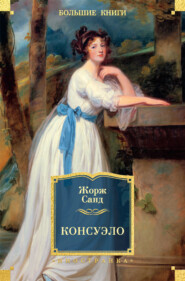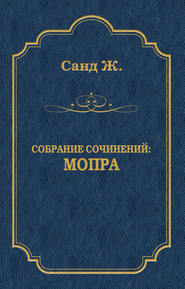По всем вопросам обращайтесь на: info@litportal.ru
(©) 2003-2025.
✖
The George Sand-Gustave Flaubert Letters
Настройки чтения
Размер шрифта
Высота строк
Поля
And if one does not take life like that, one cannot take it in any way, and then how can one endure it? I find it amusing and interesting, and since I accept EVERYTHING, I am so much happier and more enthusiastic when I meet the beautiful and the good. If I did not have a great knowledge of the species, I should not have quickly understood you, or known you or loved you. I can have an enormous indulgence, perhaps banal, for I have had to practice it so much; but appreciation is quite another thing, and I do not think that it is entirely worn out in your old troubadour's mind.
I found my children still very good and very tender, my two little grandchildren still pretty and sweet. This morning I dreamed, and I woke up saying this strange sentence: "There is always a youthful great first part in the drama of life. First part in mine: Aurore." The fact is that it is impossible not to idolize that little one. She is so perfect in intelligence and goodness, that she seems to me like a dream.
You also, without knowing it, YOU ARE A DREAM … like that. Plauchut saw you once, and he adored you. That proves that he is not stupid. When he left me in Paris, he told me to remember him to you.
I left Cadio in doubt between good and average receipts. The cabal against the new management relaxed after the second day. The press was half favorable, half hostile. The good weather is against it. The hateful performance of Roger is also against it. So that we don't know yet if we shall make money or not. As for me, when money comes, I say, "So much the better," without excitement, and if it does not come, I say, "So much the worse," without any chagrin. Money not being the aim, ought not to be the preoccupation. It is, moreover, not the real proof of success, since so many vapid or poor things make money.
Here I am with another play already underway, so as to keep my hand in. I have a novel also on the stocks, on the STROLLING PLAYERS. I have studied them a good deal this time without learning anything new. I already had the plot. It is not complicated and is very logical.
I embrace you tenderly as well as your little mother. Give me some sign of life. Does the novel get on?
G. Sand
XCVII. TO GEORGE SAND
Saturday evening
I am remorseful for not having answered at length your last letter, my dear master. You told me of the "ill turns" that people did you. Did you think that I did not know it? I confess to you even (between ourselves), that I was hurt on account of them more because of my good taste, than because of my affection for you. I did not think that several of your friends were warm enough towards you. "My God! my God! how mean literary men are!" A bit out of the correspondence of the first Napoleon. What a nice bit, eh? Doesn't it seem to you that they belittle him too much?
The infinite stupidity of the masses makes me indulgent to individualities, however odious they may be. I have just gulped down the first six volumes of Buchez and Roux. The clearest thing I got out of them is an immense disgust for the French. My Heavens! Have we always been bunglers in this fair land of ours? Not a liberal idea which has not been unpopular, not a just thing that has not caused scandal, not a great man who has not been mobbed or knifed! "The history of the human mind is the history of human folly!" as says M. de Voltaire.
And I am convinced more and more of this truth: the doctrine of grace has so thoroughly permeated us that the sense of justice has disappeared. What terrified me so in the history of '48 has quite naturally its origins in the Revolution, which had not liberated itself from the middle ages, no matter what they say. I have re- discovered in Marat entire fragments of Proudhon (sic) and I wager that they would be found again in the preachers of the League.
What is the measure that the most advanced proposed after Varennes? Dictatorship and military dictatorship. They close the churches, but they raise temples, etc.
I assure you that I am becoming stupid with the Revolution. It is a gulf which draws me in.
However, I work at my novel like a lot of oxen. I hope on New Year's Day not to have over a hundred pages more to write, that is to say, still six good months of work. I shall go to Paris as late as possible. My winter is to pass in complete solitude, good way of making life run along rapidly.
XCVIII. TO GUSTAVE FLAUBERT, in Paris
Nohant, 20 November, 1868
You say to me, "When shall we see each other?" About the 15th of December, we are baptizing here our two little girls as Protestants. It is Maurice's idea; he was married before the pastor, and does not want the persecution and influence of the Catholic church about his children. Our friend Napoleon is the godfather of Aurore, and I am the godmother. My nephew is the godfather of the other. All that takes place just among ourselves, in the family. You must come, Maurice wants you to, and if you say no, you will disappoint him greatly. You shall bring your novel, and in a free moment, you shall read it to me; it will do you good to read it to one who listens well. One gets a perspective and judges one's work better. I know that. Say yes to your old troubadour, he will be EXCEEDINGLY GRATEFUL to you for it.
I embrace you six times if you say yes.
G. Sand
XCIX. TO GEORGE SAND
Tuesday
Dear master,
You cannot imagine the sorrow you give me! In spite of the longing I have, I answer "no." Yet I am distracted with my desire to say "yes." It makes me seem like a gentleman who cannot be disturbed, which is very silly. But I know myself: if I go to your house at Nohant, I shall have a month of dreaming about my trip. Real pictures will replace in my brain the fictitious pictures which I compose with great difficulty. All my house of cards will topple over.
Three weeks ago because I was foolish enough to accept an invitation to dinner at a country place nearby, I lost four days (sic). What would it be on leaving Nohant? You do not understand that, you strong Being! I think that you will be a little vexed with your old troubadour for not coming to the baptism of the two darlings of his friend Maurice? The dear master must write to me if I am wrong, and to give me the news!
Here is mine! I work immoderately and am absolutely ENCHANTED by the prospect of the end which begins to be visible.
So that it may arrive more quickly, I have made the resolution to live here all winter, probably until the end of March. Even admitting that everything goes perfectly, I shall not have finished all before the end of May. I don't know anything that goes on and I read nothing, except a little of the French Revolution, after my meals, to aid digestion. I have lost my former good habit of reading every day in Latin. Therefore I don't know a word of it any more! I shall polish it up again when I am freed from my odious bourgeois, and I am nowhere near it.
My only excitement consists in going to dine on Sundays at Rouen with my mother. I leave at six o'clock, and I am home at ten. Such is my life.
Did I tell you that I had a visit from Tourgueneff? How you would love him!
Sainte-Beuve gets along. Anyway, I shall see him next week when I am in Paris for two days, to get necessary information What is the information about? The national guard!!!
Listen to this: le Figaro not knowing with what to fill its columns, has had the idea of saying that my novel tells the life of Chancellor Pasquier. Thereupon, fear of the aforesaid family, which wrote to another part of the same family living in Rouen, which latter has been to find a lawyer from whom my brother received a visit, so that … in short, I was very stupid not to "get some benefit from the opportunity." Isn't it a fine piece of idiocy, eh?
C. TO GUSTAVE FLAUBERT, AT CEOISSET
Nohant, 21 December, 1868
Certainly, I am cross with you and angry with you, not from unreasonableness nor from selfishness, but on the contrary, because we were joyous and HILARIOUS and you would not distract yourself and amuse yourself with us. If it was to amuse yourself elsewhere, you would be pardoned in advance; but it was to shut yourself up, to get all heated up, and besides for a work which you curse, and which – wishing to do and being obliged to do anyhow, – you ought to be able to do at your ease and without becoming too absorbed in it.
You tell me that you are like that. There is nothing more to say; but one may well be distressed at having an adored friend, a captive in chains far away, whom one may not free. It is perhaps a little coquettish on your part, so as to make yourself pitied and loved the more. I, who have not buried myself alive in literature, have laughed and lived a great deal during these holidays, but always thinking of you and talking of you with our friend of the Palais Royal, [Footnote: Jerome Napoleon.] who would have been happy to see you and who loves you and appreciates you a great deal. Tourgueneff has been more fortunate than we, since he was able to snatch you from your ink-well. I know him personally very little, but I know his work by heart. What talent! and how original and polished! I think that the foreigners do better than we do. They do not pose, while we either put on airs or grovel: the Frenchman has no longer a social milieu, he has no longer an intellectual milieu.
I except you, you who live a life of exception, and I except myself, because of the foundation of careless unconventionally which was bestowed upon me; but I, I do not know how to be "careful" and to polish, and I love life too much, and I am amused too much by the mustard and all that is not the real "dinner," to ever be a litterateur. I have had flashes of it, but they have not lasted. Existence where one ignores completely one's "moi" is so good, and life where one does not play a role is such a pretty performance to watch and to listen to! When I have to give of myself, I live with courage and resolution, but I am no longer amused.
You, oh! fanatical troubadour, I suspect you of amusing yourself at your profession more than at anything in the world. In spite of what you say about it, art could well be your sole passion, and your shutting yourself up, at which I mourn like the silly that I am, your state of pleasure. If it is like that then, so much the better, but acknowledge it to console me.
I am going to leave you in order to dress the marionettes, for the plays and the laughter have been resumed with the bad weather, and that will keep us busy for a part of the winter, I fancy. Behold! here I am, the imbecile that you love, and that you call MASTER. A fine master who likes to amuse himself better than to work!
Scorn me profoundly, but love me still. Lina tells me to tell you that you are not much, and Maurice is furious too; but we love you in spite of ourselves and embrace you just the same. Our friend Plauchut wants to be remembered to you; he adores you too.
Yours, you huge ingrate,
G. Sand
I had read the hoax of le Figaro and had laughed at it. It turns out to have assumed grotesque proportions. As for me, they gave me a grandson instead of two granddaughters, and a Catholic baptism instead of a Protestant. That does not make any difference. One really has to lie a little to divert oneself.
CI. TO GEORGE SAND
Saint Sylvester's night, one o'clock, 1869
Why should I not begin the year of 1869 in wishing to you and to yours "Happy New Year and many of them"? It is rococo, but it pleases me. Now, let us talk.
No, I don't get into a heat, for I have never been better. They thought me, in Paris, "fresh as a young girl," and those people who don't know my life attributed that appearance of health to the air of the country. That is what conventional ideas are. Every one has his system. For my part, when I am not hungry, the only thing I can eat is dry bread. And the most indigestible food, such as apples in sour cider, and bacon, are what cure me of the stomach-ache. And so on. A man who has no common sense ought not to try to live according to common-sense rules.
As for my frenzy for work, I will compare it to an attack of herpes. I scratch myself while I cry. It is both a pleasure and a torture at the same time. And I am doing nothing that I want to! For one does not choose one's subjects, they force themselves on one. Shall I ever find mine? Will an idea fall from Heaven suitable to my temperament? Can I write a book to which I shall give myself heart and soul? It seems to me in my moments of vanity, that I am beginning to catch a glimpse of what a novel ought to be. But I still have three or four of them to write before that one (which is, moreover, very vague), and at the rate I am going, if I write these three or four, that will be the most I can do. I am like M. Prudhomme, who thinks that the most beautiful church would be one which had at the same time the spire of Strasbourg, the colonnade of Saint Peter's, the portico of the Parthenon, etc. I have contradictory ideals. Thence embarrassment, hesitation, impotence.
As to whether the "claustration" to which I condemn myself may be a "state of joy," no. But what can I do? To get drunk with ink is more worth while than to get drunk with brandy. The muse, cross-grained as she is, gives less trouble than a woman. I cannot harmonize the one with the other. I must choose. My choice was made a long time ago. There remains the matter of the senses. They have always been my servants. Even at the time of my earliest youth, I did exactly as I wanted with them. I have reached my fiftieth year, and it is not their ardor that troubles me.
This regime is not amusing, I agree to that. There are moments of empty and horrible boredom. But they become more and more rare in proportion as one grows older. In short, LIVING seems to me a business for which I was not made, and yet…!
I stayed in Paris for three days, which I made use of in hunting up information, and in doing errands about my book. I was so worn out last Friday, that I went to bed at seven o'clock in the evening. Such are my mad orgies at the capital.

















